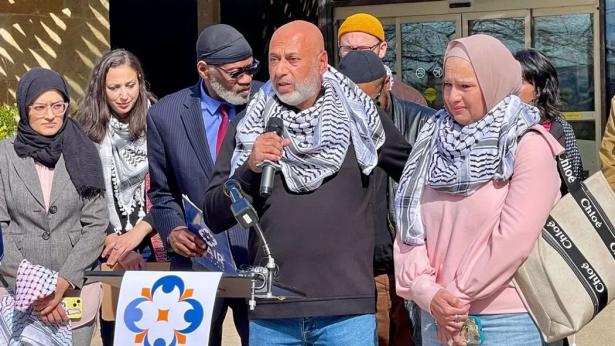Around 7 p.m. on Sunday, a group of young men drove through Austin’s West Campus neighborhood, near the University of Texas. They’d attended a large pro-Palestine rally that afternoon, where several thousand people gathered outside the state Capitol, waving Palestinian flags and hoisting signs with calls for a ceasefire in the Gaza Strip.
According to family members and local advocates, a white man on a bicycle approached the young men’s car Sunday evening and attempted to remove a keffiyeh, a headscarf that signals Palestinian solidarity, from a flag pole attached to the car. The man then allegedly attacked the car’s occupants, three of whom are Palestinian-American. Witnesses told the Council on American Islamic Relations the man pulled out a knife and stabbed one of the Palestinian Americans; the victim was later identified by his father as Zacharia Doar.
The Austin Police Department (APD) arrested 36-year-old Bert James Baker Sunday night for felony aggravated assault with a deadly weapon in connection with the incident. In a statement released Tuesday, APD dubbed the attack “bias-motivated.” Baker is being held at Travis County Jail as of Tuesday afternoon.
APD officials say the department is currently investigating the case and has asked its Hate Crimes Review Committee to look into the case before providing more information to prosecutors. “We strongly condemn all forms of crime, especially those which are bias-motivated or showing of discrimination,” reads APD’s public statement.
Travis County District Attorney Jose Garza’s office also released a statement Tuesday about the attack, saying the office “does not tolerate acts of hate in our community and is committed to holding people who commit these crimes accountable.” The DA’s office is working with APD and will review the investigative report when it’s ready, according to the statement.
On Sunday, Doar, the stabbing victim, was taken to a hospital, where he remained Tuesday morning as local leaders and advocates gathered outside Austin City Hall to condemn a recent wave of violence against Palestinian-Americans in the United States.
Zacharia’s father, Nizar Doar, stood in the beating sunlight outside of Austin’s City Hall, addressing reporters and onlookers from a podium. His son, he said, was recovering from surgery instead of being home with a 5-month-old son.
“I stand here begging and asking for the city councilmen, for the president, for the mayor, for Greg Abbott to call for a ceasefire,” Doar said. “If y’all took action three months ago, nobody would have been hurt. This has come to haunt us in our homeland. It’s come to haunt us in the U.S. It’s come to haunt us in Texas. This is not acceptable.”
The Council on American Islamic Relations, one of the largest Muslim advocacy groups in the United States, called on law enforcement to investigate Sunday’s attack as a hate crime. CAIR National Deputy Director Edward Ahmed Mitchell said in a statement that the “apparent act of hate in Austin appears to be the latest incident of hate motivated by the rise of Anti-Palestinian racism and Islamophobia.”
In October, a 6-year-old Palestinian-American boy was fatally stabbed by his family’s landlord in Illinois. The following month, three Palestinian college students were shot in Vermont. For months, academics and advocacy groups have warned about an uptick in domestic threats of violence against Palestinians, Muslims, and Jewish people as fighting in Gaza continues.
In December, three Austin city council members—Vanessa Fuentes, Jose Velasquez, and Zohaib Qadri—released a call for a ceasefire, but the larger council has not taken official action.
While local leaders hold back, tens of thousands of Texans have flooded the capital city’s streets since October in various rallies in support of Palestine amid Israel’s ongoing war with Hamas, which has claimed the lives of more than 27,000 Gazans since October, according to the Gaza Health Ministry. Late last year, the University of Texas dismissed two teacher’s assistants after they released a statement about mental health that supported “the rights and autonomy of Palestinians.” When students protested the punishment, university officials doubled down.
Austin City Council member Zo Qadri, who represents District 9, spoke at Tuesday’s event. He said he has long feared that against the backdrop of the ongoing conflict in the Middle East, “If the violence was to come here to Austin, we would see folks in the Jewish community or Muslim community touched by this violence. And I think that became a reality on Sunday night.”
MICHELLE PITCHER is a staff writer at the Texas Observer, covering criminal justice, housing, and education. She received her master’s in journalism from the University of California, Berkeley and was part of the team at The Marshall Project that won the Pulitzer Prize for national reporting. Her reporting has been featured on NPR, FiveThirtyEight, The Dallas Morning News, and more. Michelle was born and raised in Dallas and is now based in Austin.
The Texas Observer is a progressive nonprofit news outlet and print magazine covering the Lone Star State. The Observer strives to make Texas a more equitable place through investigative reporting, narrative storytelling, and political and cultural coverage and commentary. We dig beyond the headlines and contextualize news events. Our essays, reviews, and criticism seek to create a new cultural canon and challenge existing mythologies.


Spread the word